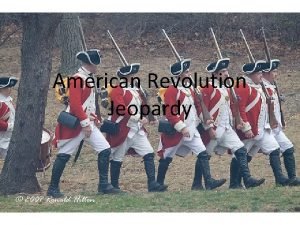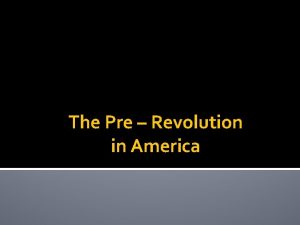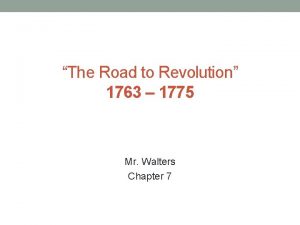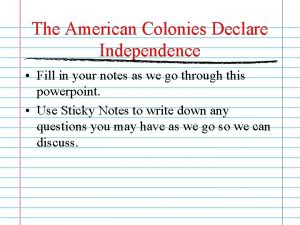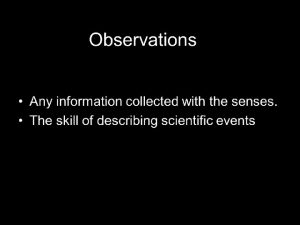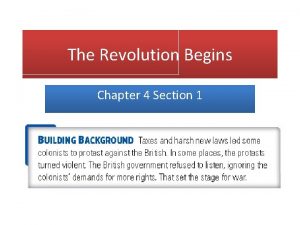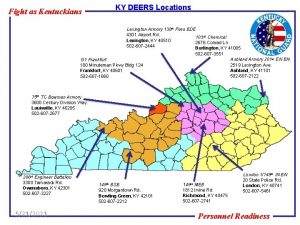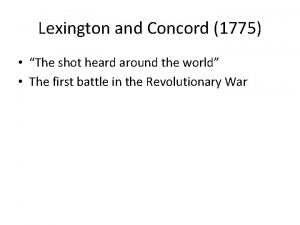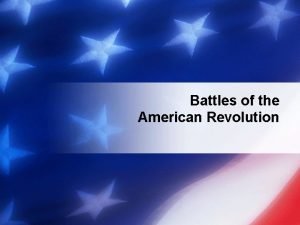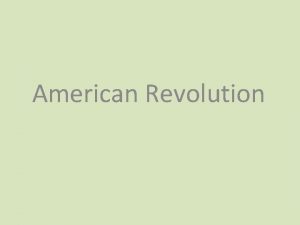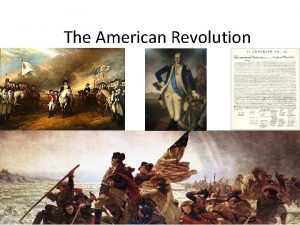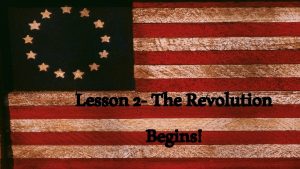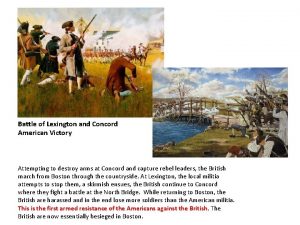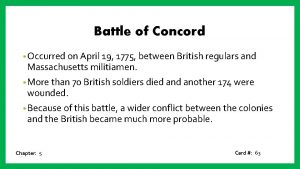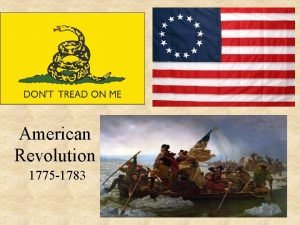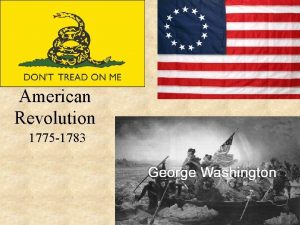The American Revolution Lexington Concord 1775 April 17




















- Slides: 20

The American Revolution

Lexington & Concord, 1775 • April 17, 1775 = British troops march to two towns to remove stockpile of weapons • Paul Revere, “The British are Coming!” • 70 British killed, over 170 wounded

Important Events in 1775 • 2 nd Continental Congress met in Philadelphia • Rejection of “Olive Branch Petition”

Declaration of Independence, 1776 • 90 towns drafted declarations • June 1776 – August 1776 • Thomas Jefferson inspired by John Locke • King referred to as “He”

Declaring Independence, from HBO’s John Adams miniseries

British Disadvantages • Lack of supplies in the colonies • Larger span of land to fight (Canada to Florida) • Lack of British soldiers • Hessians hired to fight • French entered war in 1778 • Fought against an American guerilla army • Assumed Loyalists would help fight the war

Lessons Learned from The War • U. S. needed a more centralized government • U. S. needed to overcome regionalism • Continental Congress had to: Govern 13 states Worry about finances Conduct diplomacy Create & Supply an Army

Picking a Commander-in-Chief • Could New England militia men trust a Southern officer? John Hancock George Washington • John Hancock vs. George Washington

George Washington “New Englanders are an exceedingly dirty & nasty people. ”

Battle of Saratoga, NY • British General Burgoyne • 1, 200 British men dead or wounded • October 17, 1777 = Burgoyne surrendered • American victory convinced France to join on our side

Valley Forge, Winter of 1777 – 1778 • 2, 000 Americans deserted • 2, 000 died from illness • Army ran out of food and supplies

Supply Shortage • Continental Congress could not force states to supply food, soldiers, blankets • 2 million pounds of beef, 2 million pounds of flour, 2 million tons of hay needed every 3 months • Baron von Steuben of Prussia trained the incompetent Patriots • Soldiers often deserted before completion of 1 year of service

Financial Instability • High inflation in the colonies • States and U. S. printed their own money • Soldiers paid in I. O. U. s & Land Certificates

France’s Role in the War • France recognized U. S. as a country • Official alliance = Feb. 1778 • Gave supplies, soldiers, naval power to block Britain from shipping supplies • Marquis of Lafayette

Georgia & South Carolina • Britain moved south towards the end of the war • Britain took control of Georgia & Charleston, South Carolina • Worst battles for U. S. in South Carolina

Benedict Arnold • 1779 = Traded information with British General Clinton • Tried to sell West Point Fort in New York to the British • 1780 = Arnold’s plan captured • Treason increased patriotism

Surrender at Yorktown • French navy blocked coastline of Virginia • 16, 000 French and American troops vs. 7, 500 British • 12 day battle • General Cornwallis surrendered in October 1781

Surrender Scene from The Patriot

Treaty of Paris • Not signed until 1783 • Ben Franklin, John Adams, John Jay negotiated for U. S. • U. S. got all land up to Mississippi River • British withdrew troops • Allowed to collect Benjamin Franklin debts John Adams

Why did the British lose? • Logistical Issues • Too worried about food to fight aggressively • Inability to rule the areas captured • French assistance
 Why did the battle of lexington and concord happen
Why did the battle of lexington and concord happen Ticonderoga war 1775 winner
Ticonderoga war 1775 winner Lexington and concord outcome
Lexington and concord outcome Battle of lexington and concord
Battle of lexington and concord First shot around the world
First shot around the world The road to lexington and concord
The road to lexington and concord Did american revolution cause french revolution
Did american revolution cause french revolution Magyar matematikusok
Magyar matematikusok Peter zenger american revolution
Peter zenger american revolution 1775-mr4
1775-mr4 What is the significance of july 4 1776 brainpop
What is the significance of july 4 1776 brainpop Who devised the first test for detection of arsenic in 1775
Who devised the first test for detection of arsenic in 1775 May 1775
May 1775 1750 1825
1750 1825 Chapter 4 section 1 the revolution begins
Chapter 4 section 1 the revolution begins Geoff wilson lexington ky
Geoff wilson lexington ky Ctds lexington
Ctds lexington Deers office lexington ky
Deers office lexington ky Qualex manufacturing jobs
Qualex manufacturing jobs Bluegrass hospice care
Bluegrass hospice care 380 lexington ave
380 lexington ave


